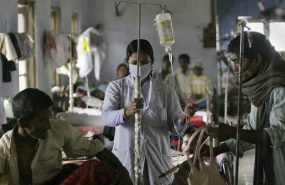Workshop: Transition from Global Fund support of HIV and TB programs to national funding: role, opportunities and priorities for civil society in Albania
- 29.10.2019 14:10
- Post Views: 1,689

Albanian HIV and TB components became ineligible for regular funding after the 2014–2016 allocations were announced and therefore Albania became eligible to receive transition funding. It will receive a three-year transition grant within the 2017-2019 allocation period. This transition grant is expected to start in January 2020 and will be a significantly lower level of investment—about one third the value of current Global Fund grants. The implementation of the current Global Fund HIV and TB grant is ending in December 2019.
According to the estimated annual needs to sustain HIV and TB responses prior to submitting the transition grant request, Albania’s needs approximately US $3 million to address its two epidemics effectively. Hence US $9 million is required over 2020-2022, the three-year period of the transition grant. With an allocation of just under US $6 million within the current HIV and TB grants, roughly 60% of the funding need is currently being met. Without significant increases in domestic funding, the funding gap is expected to grow in the coming years. Moreover, the services for key affected populations (KAPs) are largely implemented by civil society. Their scale, quality and delivery models are to be improved under the new transition grant. So far, these services have not been funded from domestic resources, though there is an office for civil society and general funding for civil society groups in the country.The national strategies on HIV and TB are expiring in 2019. The Global Fund, under its pilot ‘CCM Evolution Project,’ supports Albania’s HIV and TB governance reforms although with no clear outcome so far.

Community and civil society advocacy is critical at this conjunction of processes to ensure sustainability of the response. But at the same time the transition Funding Request 2020- 2022 poses a direct challenge to the services provided by NGOs being sub-recepients of the Global Fund grant. It is expected that starting from 2020 the number of NGOs supported by Global Fund will become twice lower, decreasing from 12 to 5. It is not clear what happens with the activities implemented by those 7 NGOs left behind and which exactly NGOs this will be.
Taking this context into account, the Eurasian Harm Reduction Association (EHRA) in coordination with the Global Fund Secretariat, decided to organize a workshop for civil society and community representatives in Albania. The workshop aimed to help improve the understanding of local civil society representatives involved in the country’s HIV and TB responses, of the Global Fund transition-related processes currently taking place in country and also to stimulate ideas, plans and opportunities for their meaningful engagement into such processes to ensure the sustainablility of HIV and TB response among key affected populations in Albania.

The participants first heard the information about the steps being taken by the government to prepare for transition of HIV/TB prevention interventions from the Global Fund’s support and also about the transition-related risks for HIV response and civil society services. Representatives of the Ministry of Finance and Ministry of Health updated the participants on the work being done to secure funding and social contracting from national and local authorities including on the public budget cycles, possibilities to advocate and influence the budget at central and local level. Guest activists from North Macedonia and Montenegro shared their lessons learnt from the transition experiences of their countries with regard to budget advocacy efforts being taken by civil society in these countries to sustain HIV response among KAPs. The representative of the Agency for Support of Civil Society informed the participants about the opportunities of funding available for NGOs, including those related to public health. On the second day of the event the participants also had the opportunity to discuss and plan the advocacy steps need to be taken by civil society in nearest future to ensure the sustainability of services for KAPs as well as to discuss their Global Fund related TA needs and plan the possible content of the potential requests for the support within the Global Fund CRG TA Program.
The event was organized by the Regional Platform for Communication and Coordination for the EECA Region, hosted by Eurasian Harm Reduction Association (EHRA).
To read or download the Report on the Workshop, please click here.
Related News
Global Fund Strategy Development – Open Consultation Questions
COVID-19 is radically altering global health, politics and economics, and the impact upon programs fighting HIV, TB and malaria will likely be tremendous. The new pandemic could completely derail our vast efforts of the past 20 years. At the same time, it has galvanized public awareness on global health security in a way that builds […] Read moreGlobal Fund Technical Brief Tuberculosis, Gender and Human Rights
The purpose of this technical brief is: to assist Global Fund applicants to consider how to include programs to remove human rights and gender-related barriers to tuberculosis prevention, diagnosis and treatment services within funding requests, and to help all stakeholders ensure that TB programs promote and protect human rights and gender equality. Post Views: 814 Read moreGlobal Fund Technical brief on HIV and key populations Programming at scale with sex workers, men who have sex with men, transgender people, people who inject drugs, and people in prison and other closed settings
The purpose of this technical brief is to provide information for countries preparing funding requests for comprehensive programs that address the cascade of HIV prevention, diagnosis, treatment, and care for the following key populations: male, female, and transgender sex workers, gay men and other men who have sex with men, transgender people (especially transgender women), […] Read moreServices for migrants and refugees from Ukraine – HIV/TB care with a focus on key populations
Due to the increasing flows of refugees from Ukraine because of Russia’s invasion of Ukraine, the EECA Regional Platform created a spreadsheet to fill contacts details of face-to-face and online services for refugees and migrants (with a focus on HIV/TB care and key population groups).
Regional Platform – EECA
This web-resource is a part of new regional communication and coordination project “Regional Civil Society and Community Support, Coordination and Communication Platform - EECA”, implemented by Eurasian Harm Reduction Association (EHRA).
Tags
See also
-
Grant Cycle 7 Reprioritization: How can communities prepare? 02.07.2025 12:03
-
Webinar: Using Global Fund's Data for Advocacy 12.06.2025 12:00







